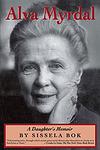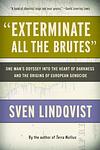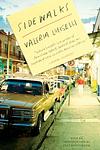The Greatest Swedish, Mexican "Nonfiction" Books Since 1980
Click to learn how this list is calculated.
This list represents a comprehensive and trusted collection of the greatest books. Developed through a specialized algorithm, it brings together 300 'best of' book lists to form a definitive guide to the world's most acclaimed books. For those interested in how these books are chosen, additional details can be found on the rankings page.
Genres
Countries
Date Range
Reading Statistics
Click the button below to see how many of these books you've read!
Download
If you're interested in downloading this list as a CSV file for use in a spreadsheet application, you can easily do so by clicking the button below. Please note that to ensure a manageable file size and faster download, the CSV will include details for only the first 500 books.
Download-
1. Alva Myrdal: A Daughter's Memoir by Sissela Bok
This memoir provides an intimate portrayal of a Nobel laureate and prominent figure in international diplomacy and social reform, as seen through the eyes of her daughter. The book delves into the complexities of the subject's public achievements and personal life, exploring the challenges she faced as a woman in the mid-20th century balancing a career with family responsibilities. The daughter's perspective offers a unique insight into the character and legacy of a woman who made significant contributions to social policy and disarmament, while also shedding light on the familial relationships that shaped her life and work.
-
2. Mexico: Biography of Power by Enrique Krauze
This book offers a comprehensive exploration of the political and social evolution of Mexico, tracing the country's history from the pre-Columbian era to the late 20th century. It delves into the lives and legacies of Mexico's influential leaders, examining how their exercise of power shaped the nation's identity and destiny. The narrative weaves through the complexities of Mexico's revolutions, reforms, and relationships with external powers, providing a deep understanding of the forces that have defined the country's path and the characters who have stood at the helm of its journey. Through a blend of biography and historical analysis, the work presents a vivid portrait of a nation's struggle for sovereignty, stability, and self-definition.
-
3. Exterminate All The Brutes by Sven Lindqvist
The book is a profound exploration of European imperialism and the roots of genocide, blending travelogue, personal diary, and historical analysis. The narrative delves into the dark history of colonialism, examining how racist ideologies were used to justify the extermination and subjugation of non-European peoples under the guise of civilization and progress. Through a series of interwoven reflections and accounts, the author confronts the violence and atrocities committed by European powers in Africa and beyond, challenging readers to acknowledge and understand the brutal legacy of colonialism that has shaped the modern world.
-
4. Tell Me How It Ends: An Essay in 40 Questions by Valeria Luiselli
This book is a powerful exploration of the critical issue of child immigration, focusing on the experiences of Central American children who arrive in the United States without their parents. The narrative is structured around 40 questions that the author, as a court interpreter, must ask the children to help determine their fate. The book provides a deeply personal and moving account of the human stories behind the ongoing debate over immigration and asylum laws.
-
5. Factfulness by Hans Rosling
The book challenges common misconceptions about the state of the world, using a wealth of statistical data to argue that, contrary to popular belief, global living conditions are improving significantly. It introduces ten instincts that distort our perspective—from the fear instinct (which leads us to perceive the world as more frightening than it is) to the destiny instinct (which causes us to assume that the fates of populations are predetermined). The author, a renowned public health expert, encourages readers to adopt a "factful" mindset, which relies on data and evidence to create a more accurate understanding of the world, ultimately fostering a more positive and productive approach to global challenges.
-
6. Life 3.0 by Max Tegmark
This book explores the future of artificial intelligence (AI) and its impact on the fabric of human existence, proposing a framework for understanding the progression of life through the lens of technological evolution. It delves into the potential scenarios that could unfold as AI surpasses human intelligence, raising profound questions about consciousness, the role of humans in a world shared with advanced AI, and how society can navigate the ethical, political, and existential challenges this new era presents. The author encourages a proactive approach to designing and governing AI technologies, emphasizing the importance of aligning them with human values and interests to ensure a future where humanity can thrive alongside increasingly intelligent machines.
-
7. No One Is Too Small To Make A Difference by Greta Thunberg
"No One Is Too Small To Make A Difference" is a collection of speeches by Greta Thunberg, a young climate activist who gained international recognition for her efforts to combat climate change. Through her powerful and passionate words, Thunberg emphasizes the urgency of taking action and highlights the responsibility of individuals, governments, and corporations to address the environmental crisis. This book serves as a call to action, inspiring readers to join the global movement for a sustainable future.
-
8. Sidewalks by Valeria Luiselli
"Sidewalks" is a collection of essays that delve into the themes of urban spaces, memory, and identity through the lens of the author's experiences in different cities around the world. The narrative weaves together personal reflections, literary criticism, and philosophical musings, offering a unique perspective on the ways in which the physical landscapes of cities intersect with the internal landscapes of our minds. Through her explorations of sidewalks, cemeteries, and other urban spaces, the author invites readers to consider the profound connections between place, history, and the self, making this work a thoughtful meditation on the nature of belonging and the transient essence of life.
Reading Statistics
Click the button below to see how many of these books you've read!
Download
If you're interested in downloading this list as a CSV file for use in a spreadsheet application, you can easily do so by clicking the button below. Please note that to ensure a manageable file size and faster download, the CSV will include details for only the first 500 books.
Download






